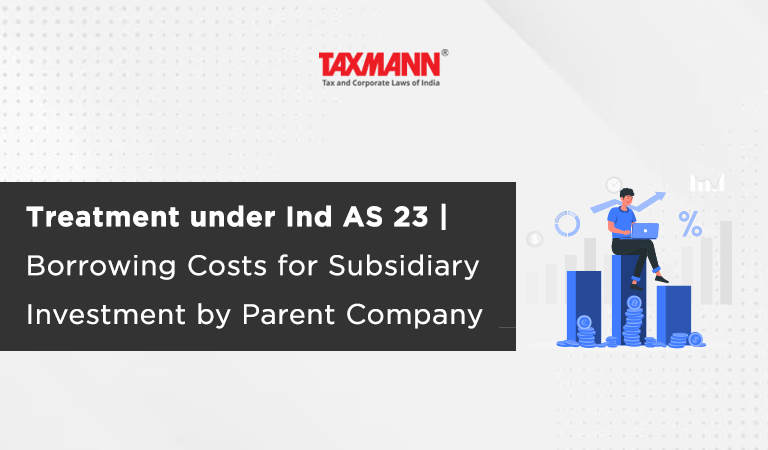Treatment under Ind AS 23 | Borrowing Costs for Subsidiary Investment by Parent Company
- Blog|News|Account & Audit|
- 2 Min Read
- By Taxmann
- |
- Last Updated on 1 April, 2023

As per para 8 of Ind AS 23, an entity shall capitalise borrowing costs that are directly attributable to the acquisition, construction or production of a qualifying asset as part of the cost of that asset. An entity shall recognise other borrowing costs as an expense in the period in which it incurs them. A company acquires 60% stake in another company which is financed through market borrowings. The subsidiary company is holding a participating interest in the asset under development (a qualifying asset as per Ind AS 23). While consolidating, the interest cost on market borrowings is charged as an expense in the statement of profit and loss instead of capitalising on the cost of the asset.
However, the auditor objects to the above accounting treatment of expensing the borrowing cost to profit and loss. As per the auditor, interest payment on a loan taken by the holding company for equity investment in a subsidiary company and where the proceeds of the loan are to finance the construction of a qualifying asset by the subsidiary company, the same should be included in the cost of the asset in the consolidated financial statements of the holding company. The company sought the opinion of EAC as to whether the company is correct in not capitalising the borrowing costs associated with the borrowings made for the acquisition of shares in subsidiary
The Expert Advisory Committee (EAC) noted that at the time of the acquisition of shares in the subsidiary company, it was already holding an interest in the asset under development. There is no direct relationship between the borrowings made by the reporting entity (viz., the Group) and the expenditure incurred on the acquisition/construction/development of the qualifying asset. Accordingly, Committee is of the opinion that the borrowing costs incurred on the acquisition of shares of the subsidiary company cannot be capitalised in the consolidated financial statements.
Click Here To Read The Full Story
Disclaimer: The content/information published on the website is only for general information of the user and shall not be construed as legal advice. While the Taxmann has exercised reasonable efforts to ensure the veracity of information/content published, Taxmann shall be under no liability in any manner whatsoever for incorrect information, if any.

Taxmann Publications has a dedicated in-house Research & Editorial Team. This team consists of a team of Chartered Accountants, Company Secretaries, and Lawyers. This team works under the guidance and supervision of editor-in-chief Mr Rakesh Bhargava.
The Research and Editorial Team is responsible for developing reliable and accurate content for the readers. The team follows the six-sigma approach to achieve the benchmark of zero error in its publications and research platforms. The team ensures that the following publication guidelines are thoroughly followed while developing the content:
- The statutory material is obtained only from the authorized and reliable sources
- All the latest developments in the judicial and legislative fields are covered
- Prepare the analytical write-ups on current, controversial, and important issues to help the readers to understand the concept and its implications
- Every content published by Taxmann is complete, accurate and lucid
- All evidence-based statements are supported with proper reference to Section, Circular No., Notification No. or citations
- The golden rules of grammar, style and consistency are thoroughly followed
- Font and size that’s easy to read and remain consistent across all imprint and digital publications are applied



 CA | CS | CMA
CA | CS | CMA
